The concept seems innocuous enough. After all, who would favor “unsustainable development”? A careful review of the data, however, finds that resources are becoming more–not less–abundant with time and that the world is in fact on a quite sustainable path at present.
Moreover, the fundamental premise of the ideathat economic growth, if left unconstrained and unmanaged by the state, threatens unnecessary harm to the environment and may prove ephemeral–is dubious. First, if economic growth were to be slowed or stopped–and sustainable development is essentially concerned with putting boundaries around economic growth–it would be impossible to improve environmental conditions around the world. Second, the bias toward central planning on the part of those endorsing the concept of sustainable development will serve only to make environmental protection more expensive; hence, society would be able to “purchase” less of it. Finally, strict pursuit of sustainable development, as many environmentalists mean it, would do violence to the welfare of future generations.
The current Western system of free markets, property rights, and the rule of law is in fact the best hope for environmentally sustainable development.


